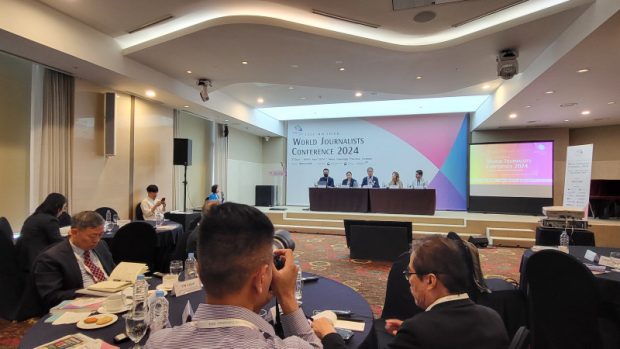
What relations between journalism and AI? Thailand examples stressed at WJC 2024

By Habib Toumi
SEOUL: With artificial intelligence (AI) taking center stage in news reporting, Thailand’s journalism landscape is undergoing a significant shift, Pensopa Sukontarak, Senior Reporter, Thai Journalist Association, has said.
Addressing the World Journalists Conference 2024 in the Korean capital Seoul, Sukontarak stressed that AI-powered journalism has emerged as a game-changer, revolutionizing how news is gathered, analyzed, and disseminated in her country and elsewhere.
Her presentation came amid the deepening controversy about how to define best the relation between the media industry and generative artificial intelligence techniques.
Sukontarak stressed that the expanding landscape of AI journalism in Thailand is having a strong impact on the future of media while offering valuable insights, she told the conference of journalists from across the world.
“AI journalism in Thailand has gained momentum in recent years. This is driven by advances in AI natural language processing (NLP) and machine learning technologies,” she said.
“Newsrooms across the country are increasingly leveraging AI-powered tools to perform routine tasks like data collection. fact checking, data storage and even writing news and production of news graphics This not only helps speed up the news production process. But it also improves the accuracy of reporting.”
Sukontarak said that one of the key advantages of AI journalism is its ability to increase the efficiency and accuracy of news reporting.
“By automating time-consuming tasks such as analysis through large amounts of data or transcribing interviews. AI-powered tools help journalists focus more on in-depth analysis and investigative reporting. AI algorithms can also identify patterns and trends in data. This supportive data allows journalists to find interesting stories.”
AI journalism also has huge potential to personalize news content and increase audience engagement. AI algorithms can analyze user behavior and preferences to provide curated news recommendations to suit readers’ diverse interests.
“AI-powered chatbots and virtual assistants also provide instant access to news updates. and facilitate interactive conversations with readers. This fosters a deeper connection between news organizations and their audiences. For Thairath TV, we are the first news station to start using the MiMir intelligent system this year. For storage news image files.”
She added that this is useful in store news image files that are tagged, transcribed, and translated. It can detect the faces of people in news images and label detection.
The Thairath TV news website has implemented a Content Recommendation system and has been trialed for 2 years.
It is a system that Thairath developed itself to study the behavior of website users. and present news that is expected to match the interests of readers Results show that click-to-rate (CTR) increased from 1.5% to 4%.
“As for advertising on the web, AI technology is used to analyze readers’ interests. Despite its potential benefits, AI journalism in Thailand also presents several challenges and ethical considerations,” she said.

Sukontarak stressed that one of the primary concerns is the potential for algorithmic bias, where AI systems may inadvertently perpetuate stereotypes or misinformation.
“Moreover, there are concerns about the impact of AI on journalistic integrity and the role of human journalists in the newsroom. Additionally, questions about data privacy and transparency loom large, as the collection and analysis of user data raise ethical concerns. Mr. Chavarong Limpattamapani, Chairman of the National Press Council of Thailand, said that there are precautions in using technology in the work of journalists, that is, checking the accuracy of information thoroughly before using it, and specifying clearly whether the information is taken from AI or uses AI technology in production to prevent viewers from being confused and misunderstood.”
Addressing the way forward for media, Sukontarak said that there are opportunities and innovations and that AI journalism is poised to reshape the future of media in Thailand and beyond.
“By harnessing the power of AI technologies, news organizations can unlock new possibilities for storytelling, audience engagement, and revenue generation. Collaborations between journalists and AI experts can drive innovation and foster the development of cutting-edge solutions tailored to the needs of the industry,” she said.
“Furthermore, experimentation with immersive technologies like virtual reality (VR) and augmented reality (AR) offers exciting opportunities to redefine the news media experience and captivate audiences in new and innovative ways.”
She quoted Mr.Tanachol Trakulrungsi, Graphic Television Manager for Visual and design department, as saying that the challenges for journalists in the AI era include adapting to become users and developing own potential to be ready and have the ability to use AI to get the job done correctly as desired and provide maximum benefit to the organization.
“Entering the AI era is just a transition to another era. We must know and know how to use it. and be alert to always developing yourself because it is seen that AI technology will advance rapidly in the next 2 years.” he was quoted as saying.
Addressing the question of concern whether AI will replace jobs or not, he dismissed issues “because AI will be an assistant in doing work rather than taking over the job.”
“We should adapt like motorbike drivers who joined the Grab app to reach more passengers. AI journalism is redefining the landscape of news reporting in Thailand, offering unparalleled efficiency, accuracy, and audience engagement. While it presents challenges and ethical considerations, the potential benefits are undeniable,” Sukontarak quoted him as saying.
“As news organizations continue to embrace AI technologies, they must do so responsibly, ensuring transparency, accountability, and journalistic integrity. Ultimately, AI journalism holds the promise of a more dynamic, personalized, and insightful media landscape in Thailand, shaping the future of news reporting for generations to come.”


